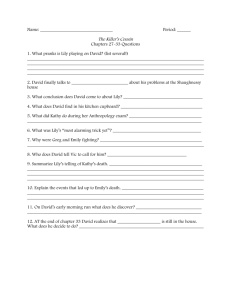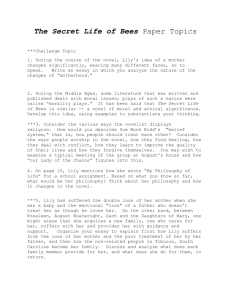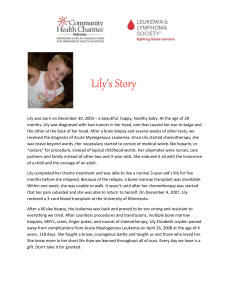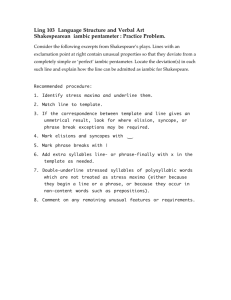spring_assignment_1
advertisement
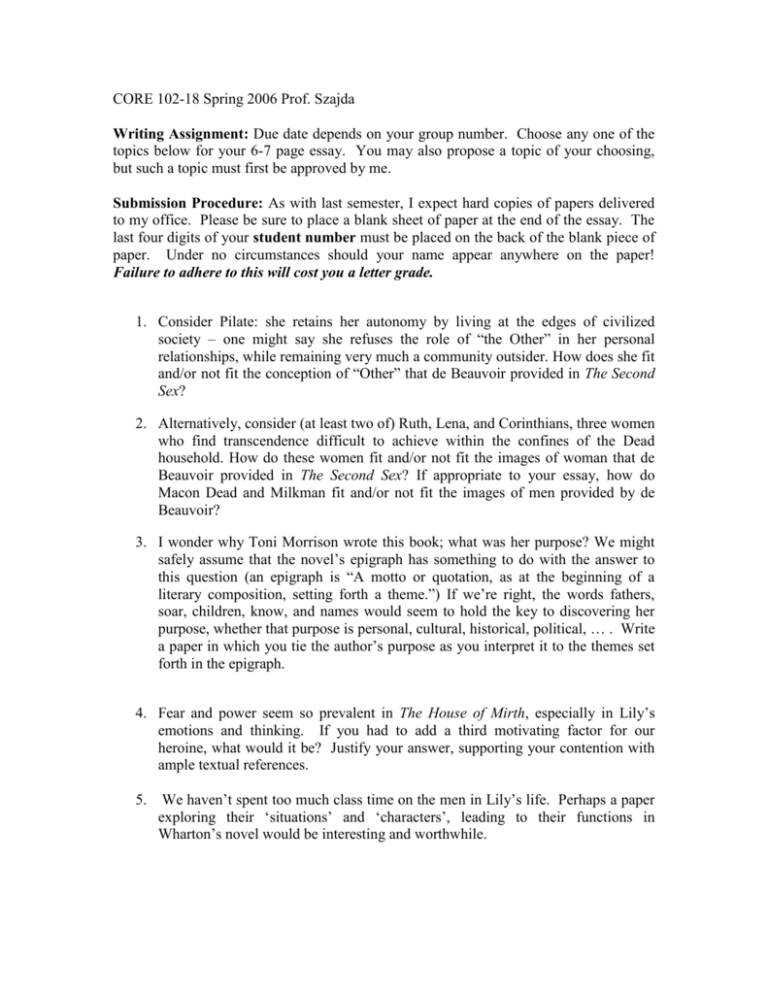
CORE 102-18 Spring 2006 Prof. Szajda Writing Assignment: Due date depends on your group number. Choose any one of the topics below for your 6-7 page essay. You may also propose a topic of your choosing, but such a topic must first be approved by me. Submission Procedure: As with last semester, I expect hard copies of papers delivered to my office. Please be sure to place a blank sheet of paper at the end of the essay. The last four digits of your student number must be placed on the back of the blank piece of paper. Under no circumstances should your name appear anywhere on the paper! Failure to adhere to this will cost you a letter grade. 1. Consider Pilate: she retains her autonomy by living at the edges of civilized society – one might say she refuses the role of “the Other” in her personal relationships, while remaining very much a community outsider. How does she fit and/or not fit the conception of “Other” that de Beauvoir provided in The Second Sex? 2. Alternatively, consider (at least two of) Ruth, Lena, and Corinthians, three women who find transcendence difficult to achieve within the confines of the Dead household. How do these women fit and/or not fit the images of woman that de Beauvoir provided in The Second Sex? If appropriate to your essay, how do Macon Dead and Milkman fit and/or not fit the images of men provided by de Beauvoir? 3. I wonder why Toni Morrison wrote this book; what was her purpose? We might safely assume that the novel’s epigraph has something to do with the answer to this question (an epigraph is “A motto or quotation, as at the beginning of a literary composition, setting forth a theme.”) If we’re right, the words fathers, soar, children, know, and names would seem to hold the key to discovering her purpose, whether that purpose is personal, cultural, historical, political, … . Write a paper in which you tie the author’s purpose as you interpret it to the themes set forth in the epigraph. 4. Fear and power seem so prevalent in The House of Mirth, especially in Lily’s emotions and thinking. If you had to add a third motivating factor for our heroine, what would it be? Justify your answer, supporting your contention with ample textual references. 5. We haven’t spent too much class time on the men in Lily’s life. Perhaps a paper exploring their ‘situations’ and ‘characters’, leading to their functions in Wharton’s novel would be interesting and worthwhile. 6. In her 1935 introduction to the Oxford University Press edition of The House of Mirth, Wharton spoke of ‘the key’ to the story in Darwinian metaphors: Nature, always apparently wasteful, and apparently compelled to create dozens of stupid people in order to produce a single genius, seems to reverse the process in manufacturing the shallow and the idle. Such groups always rest on an underpinning of wasted human possibilities; and it seemed to me that the fate of the persons embodying these possibilities ought to redeem my subject from insignificance. Explore Darwin-like metaphors in the text of The House of Mirth with an eye toward ‘Nature’, ‘reproduction and genius ’, ‘possibilities and fate’. I suppose you’ll consider Lily’s plight within the framework of ‘survival of the fittest’ – it’d be best I think to concentrate on Wharton’s metaphors, making your case without yielding to any temptation you may have to say something like “Survival of the fittest explains the whole novel”, since that type of thesis won’t lead to a very interesting paper in my estimation (too simple, trite, cliché). 7. Instead of Darwin, you might offer a Marxian interpretation of the society in which House of Mirth takes place. Topics such as “ideology vs. materialism”, “fetishism of commodities”, “the secret of primitive accumulation”, “the sale and purchase of labor power”, “bourgeois society and values”, “class conflict” ... come to mind – you won’t be able to treat all of these so narrow your thesis to some specific aspect offered by Marx. Note: it may be useful to distinguish between “petit bourgeoisie” and “haute bourgeoisie” if you decide to approach the paper from the bourgeois angle – you can look up these terms. 8. In the chapter of The Second Sex entitled Situation and Character (p624), de Beauvoir writes, “It is evident that woman’s ‘character’ – her convictions, her values, her wisdom, her morality, her tastes, her behavior – are to be explained by her situation. The fact that transcendence is denied her keeps her as a rule from attaining the loftiest human attitudes: heroism, revolt, disinterestedness, imagination, creation; but even among males these are none too common.” Examine Lily Bart and the men in her life, their relationships to each other or to their social milieu in 1905 New York, in light of de Beauvoir’s philosophy. 9. Wharton writes much about “the two Lilys” and “the real Lily”. Think about the contexts within which these allusions to public and private personae appear. Think about Lily’s encounters with mirrors throughout the novel and discuss whether the light in which Lily perceives herself changes as the novel goes on. You might choose to address such questions as: How is an aesthetic appreciation of Lily as a work of art and beauty bound up with relations of power and manipulation of others? How does Lily manipulate and deceive others, and how do they manipulate and deceive her? How do women wield power in this social world anyway? 10. Speaking of aesthetic appreciation of women, perhaps a comparison of Lily and Sita would be interesting; one could start with the women themselves and comment on how the qualities being appreciated reflect the interests of the societies to which these women belong. 11. In her last days, Lily speaks with Rosedale, Selden, and Nettie Struther as she considers society’s treatment of individuals, human fellowship, the conditions of life and personal happiness. Imagine de Tocqueville were to speak to Lily about government, saying: We must first decide what the purport of society and the aims of government are held to be. If it be your intention to confer a certain elevation on the human mind, and to teach it to regard the things of this world with generous feelings, to inspire men with a scorn of mere temporal advantage, to give birth to living convictions, and to keep alive the spirit of honorable devotedness; if you hold it to be a good thing to refine the habits, to embellish the manners, to cultivate the arts of a nation and to promote a love of poetry, of beauty, and of renown … -- if you believe such to be the principal object of society, you must avoid the government of democracy, which would be a very uncertain guide to the end you have in view. But if you hold it to be expedient to divert the moral and intellectual activity of man to the production of comfort, and to the acquirement of the necessities of life … if, in short, you are of the opinion that the principal object of a Government is … to insure the greatest degree of enjoyment and the least degree of misery to each of the individuals who compose it … you can have no surer means of satisfying (these desires) than by equalizing the conditions of men (and women), and establishing democratic institutions. Which alternative would Lily choose? Is that choice significantly different from what she experiences in the novel? What arguments would she employ to convince us of the correctness of her choice? 12. In his Confessions, Augustine looks back over his life through the eyes of the ascetic he has become. How are the retrospective evaluations he makes of his experiences similar or different from the evaluations that Nietzsche’s ascetic priest would make of them? 13. There are (at least) three pairs of opposites running through the novel: a. Light/Dark b. Sun/Moon c. Truth/Lies Choose two such pairs, trace their usages throughout the novel think about whether the usages are acting in concert to produce a single effect or whether Bulgakov uses each pair for slightly different purposes. 14. As individuals, how are the Master and Margarita different from other characters in the novel? What is the basis for their relationship -- i.e. what does each see in the other or get from the other? For this last part, look for specific clues in the scenes they share and in their expressions of longing when they are separated. 15. Would Bulgakov agree with Nietzsche that sins (whether small or large) are what make people interesting? 16. Nietzsche's perspectivism (see p. 119, Third Essay in the Genealogy of Morals) has been described as the view that all views are but interpretations. Take a look at the accounts of the week between Palm Sunday and Easter given in Master and Margarita (Pilate's perspective) and The Gospel of Matthew (gospel writer's perspective). Examine the relationships between interpretation and fact in these two accounts. Develop an interesting thesis and support your contention using specific examples. For the Gospel of Matthew, the following chapters and verses should suffice (21:1-27, chapters 26 and 27). 17. Examine parallels between the Moscow story and the Yershalaim story with a view to answering this question: Why did Bulgakov choose to present these stories in the framework of a single novel? 18. The lure of life’s sensual pleasures seems to bedevil both Augustine as a young man in Confessions and Antony as an older man in Shakespeare’s Antony and Cleopatra. What relationship does that lure bear to a sense of self for each of these two men, and is that relationship essentially the same in the two cases or is it essentially different? Does the relationship shift over time for either men or both? 19. Both Antony and Augustine struggle to reconcile what they owe to self and what they owe to higher claims—to Rome, in the case of Antony, and to God, in the case of Augustine. What light does each man’s struggle with these conflicting claims shed on the struggle of the other? 20. What is Nietzsche saying in his description of the “dark workshop” where “ideals are made” (46-48), and how does this passage fit into the overall meaning of his text? In your essay, be sure you examine the passage in detail and subject it to close analysis. Consider not only what the passage is saying, but how it conveys its meaning. 21. In one of her short stories, author Katherine Anne Porter has written: The difference then between mere adventure and a real experience might be this: that adventure is something you seek for pleasure, or even for profit, like a gold rush or invading a country; for the illusion of being more alive than ordinarily, the thing you will to occur; but experience is what really happens to you in the long run; the truth that finally overtakes you. Is this distinction between adventure and experience of any value in comparing the life of Augustine, as retold in his Confessions, with the life of Mark Antony, as told in Antony and Cleopatra? Why or why not? Be sure to consider carefully what each man seeks, or wills, to occur and why, and what “truth” or truths finally overtake each of them. 22. Compare the role friendship plays in the life of Enobarbus in Antony and Cleopatra and in the life of Augustine in Confessions. Consider in each case such questions as the nature and meaning of friendship, the ways it comes into conflict with other claims, and the risks and rewards it entails. 23. Are the main protagonists of Shakespeare’s play “good” in the sense in which Nietzsche employs this word? Describe a Nietzschean synthesis of the Roman and Egyptian values presented in Antony and Cleopatra or explain why, based on evidence from the play and from Nietzsche’s writings, you believe no such Nietzschean synthesis is possible. 24. Is it possible to conclude from Shakespeare’s play that societies exist not to reign in the powerful, but only to permit them to exercise power on a grander stage? How might Nietzsche have chosen to resolve the sorts of conflicts between personal affairs and affairs of state experienced by Cleopatra and Antony? Does Caesar, for example, represent such a resolution? Support your thesis with lines from both major and minor characters in Shakespeare’s play. 25. From Caesar, Antony, and Cleopatra we get eagle's-eye views of other eagles (i.e. consider the term "eagle" equivalent to Nietzsche's "beast of prey"). While Enobarbus is not exactly a lamb, he is certainly a non-eagle. He observes the eagles, makes value judgments about their actions, responds with both emotion and calculation. What is his view of himself and particularly, what is it he wants from the eagles in exchange for his service to them? Which of their qualities inspire his loyalty and which does he despise? Though not exactly a lamb, is he nevertheless a victim in this play? 26. Compare any two of the texts we’ve read this year. Ideally, your choice of a topic will reflect a genuine curiosity about a particular aspect of the two texts. Your choice should also lead you to take a fresh look at the texts—that is, to approach them from a new angle and, ideally, to uncover important meanings that we overlooked when we originally discussed the texts. As you begin to think about possible topics, you may find yourself focusing on general areas of similarity, but by the time you write your paper you should settle on a very specific topic, one not previously considered or emphasized in class discussion or in earlier essay assignments or on examinations.
